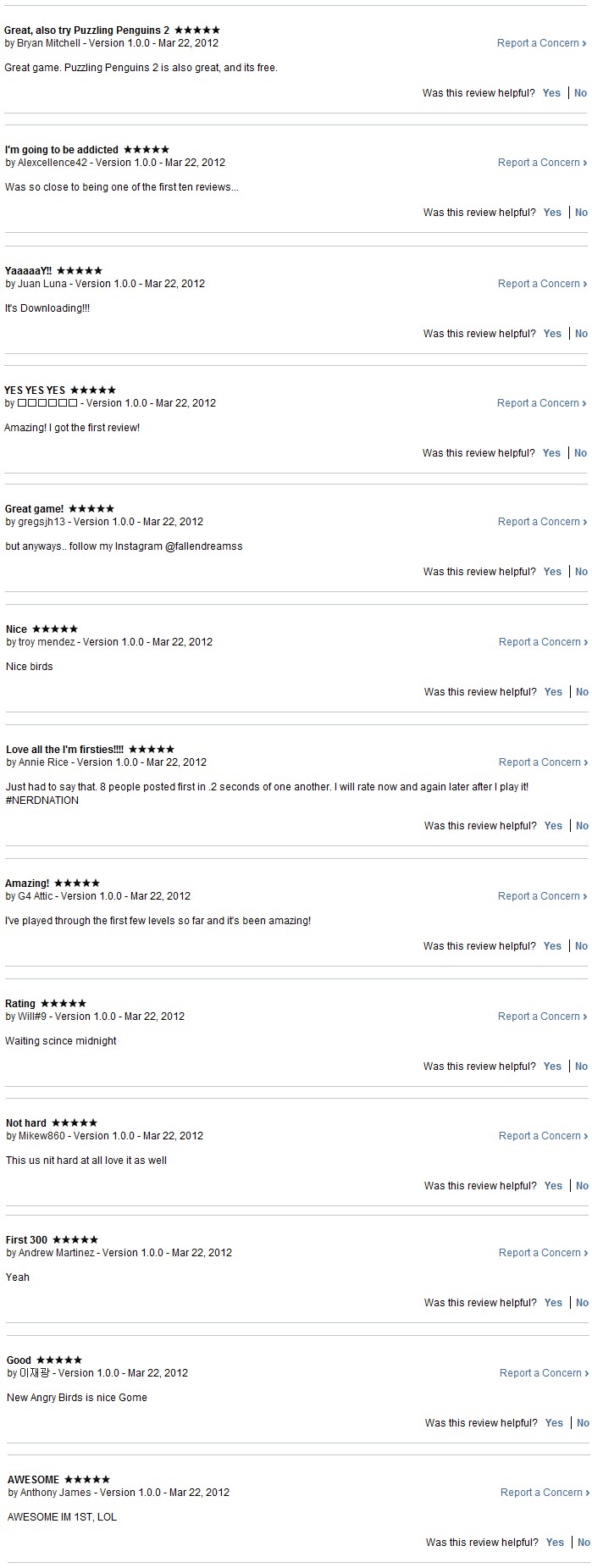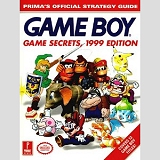The voice of the people
We've written before about the democratisation of criticism, and how it's all but obliterated genuine videogames journalism. Here's what the phenomenon has brought us, in the shape of some reviews of Angry Birds Space, which was released today.
Click to enlarge if you can't read them. (NB Unlike Amazon, you do actually have to buy/download a game on iTunes before you can review it.)
Ouch, that last one's pretty brutal – only three stars for a game that crashes every time you try to load the first level? Enjoy the future, readers!








































*sob*
My parents have always chosen the Radio Times as their TV listings mag. Which of course, was forever published by BBC Magazines, though recently sold off.
Many is the time that while living at home, or over the phone, they would tell me "Good programme on tonight. Half past nine, BBC 2. 'Choice'" or "Last in the series of that new series, it's been alright so far, but the last one's got 'Choice' tonight, so it must be worth watching"
No matter for how many years I tried to tell them "But haven't you noticed that these 'Choice' programmes are nearly always on the BBC? And that when another channel has some big show on, whatever's on the BBC that night is almost always listed as being 'Choice'? And that when it's the first episode or the last of some big BBC ratings-grabber – or a flop series they're trying to push anyway – it's always 'Choice'?
"… … … … Well, it's got to be good, see, it says it here. The magazine says it. It's 'Choice'. So it's got to be good."
I've drawn out that little story to try and paint the full horror of over a decade of being phoned up to say "Watch <whatever the fuck> tonight, it's 'Choice'" "LEAVE ME ALONE". And because at least it was obvious that there was bias, it being published by BBC Magazines.
In the case of the above, how many of those comments do you think will be by Roxio employees, or elements of its marketing team, or friends of the developers? Not only is it aaargh-inducing bullshit, there's no way to infer bias.
If there was some way to sort out *that* issue on iTunes, maybe then we could turn to the issue of average consumers being fucktards.
I don't think any of us believe that this is actually any different to professional games journalism.
The reviewers in each case know what score the game is going to get before they put pen to paper, they don't play much – or any – of the game before writing anything down, they're desperate to be the first one in print, and the scores are so universally high in any case as to make a mockery of the system.
As you've written about previously, professional journalists do it because they're beholden to deadlines and advertisers, but we long ago accepted (en masse, at least) that a glowing review of a half-finished review copy was good enough for us, provided it was the first one on the shelves – especially if it was accompanied with some pretty screenshots.
Review scores have been a nonsense for decades – if you wanted a decent critique in the print-only days you'd look for a reviewer you agreed with, who wrote entertainingly and didn't seem to talk absolute bollocks, and even then you'd take his advice with a pinch of salt.
I don't think that's really changed – other than now it's even easier to find opinions and reviews that are more than a build-up to a review score, and might even occasionally be written by someone who has played most of the game.
I used to write reviews
I remember a few times to being asked by the editor to maybe recast my review to accentuate the positive features more, because of some competition or advertising deal
I'm amazed at how many first reviews there are.
It does seem to be more of an issue in games criticism than in any other medium. If you look at Metacritic, movies and music reviews with an average score in the sixties still count as "mainly positive". For games, anything in the mid to low seventies falls below the "mixed or average reviews" threshold.
Does anyone know why scores are weighted in this way? Is it simply because games journalists are more venal?
Even "It crashes every time I try and load the first level" gave it 3 stars. What does it have to do to get 1*? Come round your house and s**t in your breakfast?
It couldn't be a more perfect microcosm of professional reviews if it tried.